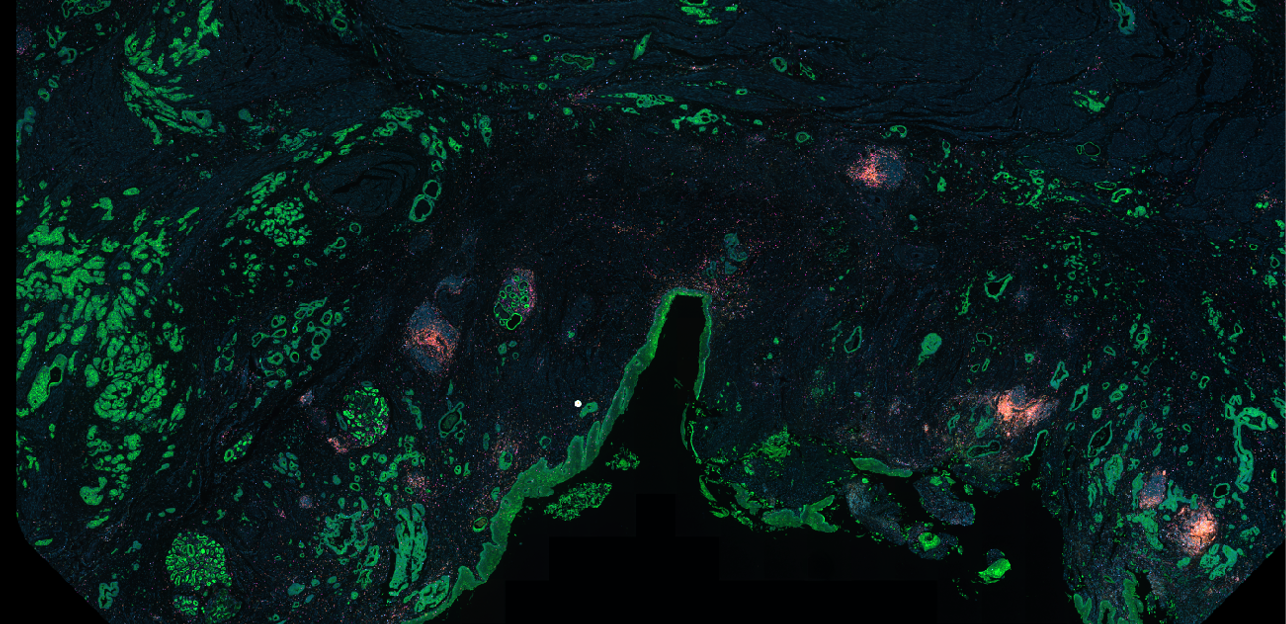
Contact
Group Lead
Stefan Antonowicz
s.antonowicz@imperial.ac.uk
What we do:
We are understanding how cancer structure governs its biology, to ultimately develop new clinical and research tools. We use our skills in spatial biology, biochemistry and surgery to address this, leveraging our access to patient samples, complex ex vivo models and bioengineering. Our overarching objective is to use our biological gains to improve outcomes for our patients.
Why it is important:
UK oesophagogastric cancer patients have unmet need; five-year survival is <20% and among the poorest in Europe. In the curative setting <30% patients have a good response to standard-of-care neoadjuvant chemotherapy (“FLOT” – 5-fluorouracil, oxaliplatin and docetaxel). FLOT has a significant burden of toxicity, so up to 50% receive even less effective treatment. Immunotherapy and other systemic anti-cancer therapies (SACT) provide limited benefit in minority subsets. Patients, funders and policy-makers recognise this: more cures with better, kinder systemic treatment are the highest research priorities for our partner patient-communities, for example Action Against Heartburn (UK OAC advocacy group).
How it can benefit patients:
Our key objectives are (i) to improve the small number of patients surviving these cancers (ii) to reduce treatment toxicity, so better cures mean kinder cures (iii) to improve long-term function after successful cures, again to increase the quality of survivorship. These objectives reflect the priorities set by our partner patient-communities
Summary of current research:
Structural heterogeneity:
- Understanding the cause and effects of metabolic heterogeneity in upper GI cancer, with an ultimate goal of a novel metabolism-directed treatment (collaboration with Takats group among others).
- Establishing the pattern of persistent upper GI cancer after neo-adjuvant treatment, and what causes it, with a view to improving the effectiveness of that treatment (collaboration with Goldin and Brown labs)
- Investigating whether clinically-actionable metabolic heterogeneity is non-invasively detectable (collaboration with Papalois and Takats labs)
- Using advanced histopathology and machine learning approaches to under how cancer structure governs function (collaboration with Goldin, Raza and Lund labs)
Tissue multiphysics:
- Understanding how tissue architecture can influence drug transport and effectiveness in upper GI cancer, and how this can be exploited therapeutically (collaboration with Dini group and others)
- Local treatment of oesophageal adenocarcinoma through tissue engineering (MRC project grant, collaboration with Valpione, Eposito, Chen and Dini labs)
Focussed metabolic pathways
- Understanding how hypoxia and acidosis influence lipid reprogramming and volatile organic compound production in oesophageal adenocarcinoma (collaboration with Hanna labs)
- Investigation of how ERBB2 amplification influences lipid reprogramming and volatile organic compound production in gastric cancer (collaboration with Hanna and Hochhauser labs)
Device development:
- Producing tools to assess chemotherapy sensitivity outside patients (collaboration with Dyson School of Design Engineering)
- Producing tools to enable drug delivery in the GI tract (collaboration with Temelkuran lab)
Additional information
External
- Professor Rebecca Fitzgerald (University of Cambridge)
- Professor Daniel Hochhauser (University College London)
- Professor Shan E Raza (University of Warwick)
- Professor Nigel Jamieson (University of Glasgow)
- Professor Nicole Strittmitter (Technical University of Munich)
- Professor Maria Secrier (University College London)
- Dr Richard Turkington (Queens University Belfast)
- Dr Sara Valpione (University of Manchester)
- Dr Michael Chen (University of Edinburgh)
- Dr Michela Esposito (University College London)
- Dr Tom Lund (Institute for Cancer Research)
Internal
- Saki Okada
- Afroza Sharmin
- HYDRA Study
- NIHR-SARONG study
Our researchers
Mr Stefan Antonowicz
/prod01/channel_3/media/images/people-list/Stefan--Antonowicz.jpg)
Mr Stefan Antonowicz
Clinical Senior Lecturer
Ana Giraldo Rincon

Ana Giraldo Rincon